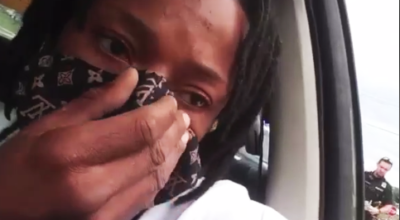Across the U.S. police departments enforce their state’s commercial trucking statutes upon people who are not truckers. On June 29, two cops serving the Tulsa municipal corporation and enforcing the trucking law stopped David Ware on grounds of alleged careless driving and violations of rules of the road, rules that apply to all people involved in transportation.
By David Tulis / NoogaRadio 92.7 FM
A news report says he was pulled over because he had an expired tag. Tags are required of all people using their cars as motor vehicles, and are proof of privilege taxes having been paid to use the vehicle in the transportation business.
Early reports indicate Mr. Ware was a private traveler. A police department video compilation shows Mr. Ware is not cooperative, and the two officers escalate their demands into the use of a choking and blinding gas sprayed several times at Mr. Ware, and shooting him with an electrocution weapon designed to be “sub-lethal,” just short of fatal. Tasers are not to be used except in extreme situations in which the officer faces death, but they are used routinely across the U.S. to shock people to win obedience to “lawful orders,” often causing death.
The officers are unwilling to let Mr. Ware go so they might get a warrant for his arrest. But they attempt to subdue him by force and torture. In scenes that are excruciating to watch, they abuse him. He reaches into the car for a pistol and opens fire.
‘Traffic stops’ most dangerous to officers
This reporter has warned local government in the Chattanooga area about the dangers of so-called traffic stops, especially when two Tennessee laws are violated in the performing of them.
This reporter informed by Hamilton County Commission and the Chattanooga city council orally and in writing that Tennessee law does not allow for on-the-spot arrests of travelers unless the officer sees the person commit a felony or unless the person is involved in an accident, a wreck in which DUI or flight are elements.
But chief David Roddy and Sheriff Jim Hammond routinely send officers into such encounters against people on the public road, despite the clear lack of legal authority, and despite my having put both parties under Tennessee transportation administrative notice, intended to reform their practices vis a vis users of the public right of way.
I have told both bodies that they are putting officers needlessly into “traffic stops” — and that they need to halt the practice because of danger to employees. Traffic stops are the most dangerous type of public encounter for police and deputies. Traffic arrests (for every stop is an arrest under Tennessee law) are more dangerous than domestic dispute and 911 calls, which come in second.
Given that it is increasingly hard to get recruits or to win transferring officers from other departments, it is time in light of the Tulsa killing that law enforcement brass here in Southeast Tennessee reconsider the lives of their officers, and their personal safety.
David Ware in Tulsa was defending himself from potentially lethal abuse, and it is fair to say the two offices tortured him alongside the roadway. He is accused of first-degree murder, shooting with the intent to kill, possession of a firearm after a felony conviction, and drug possession with the intent to distribute.
Officers in Tennessee who wish to make an arrest must first get a warrant. Waiting to get the warrant lets situations such as the Ware encounter cool off, and would tend to bring a spirit of compliance with the person accused, who is told to depart and the officer will come to his house or place of business to arrest him. Scenes of cops dragging people from their cars are all too common, and in Tennessee are a chargeable and indictable crime if the act violates Tenn. Code Ann. § 40-7-103, arrest by officer without a warrant.
A notice about the requirements of this law was received by city and county April 15.



Every stop is a drug and alcohol search regardless of “traffic” or other claims made by officer; police wrongfully claim that a bad turn or light out granted the execution of a false arrest. The victim should have tendered a fee schedule and also offered to follow all lawful orders from the senior officer; then file a valid cause of action.
The victim probably had a thought that the well-dressed men were going to do him harm and proceeded to attempt to bargain with them, he was not successful.
Q: At that time; was the victim living in his car?
I see a man, seemingly horrified, over the possibility of being locked into a cage and being robbed of his property;
Q: Why cannot the officers simply offer to follow the victim home safely, and then let him be; the wrongdoers should never have offered “DO-AS-I-SAY-OR-GET-TAZED”
I see a false arrest, assault, battery, armed robbery, not one lawful order.
Q: why didn’t the wrongdoers simply follow the victim and help him if he crashed, or let-him-be if he doesn’t crash? If the victim were to crash the wrongdoers would have had cause to offer assistance;
Terrible results resulting from a clash of ignorance.